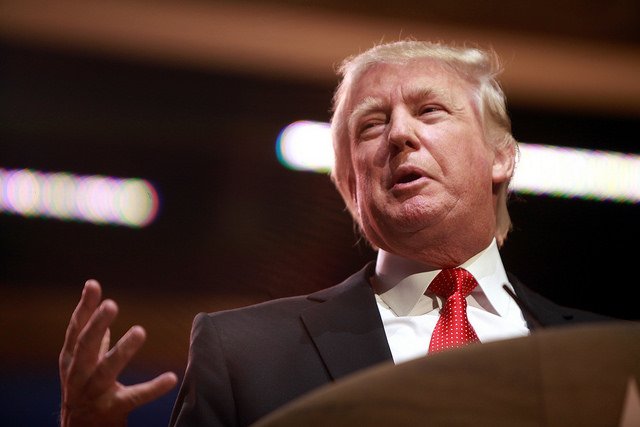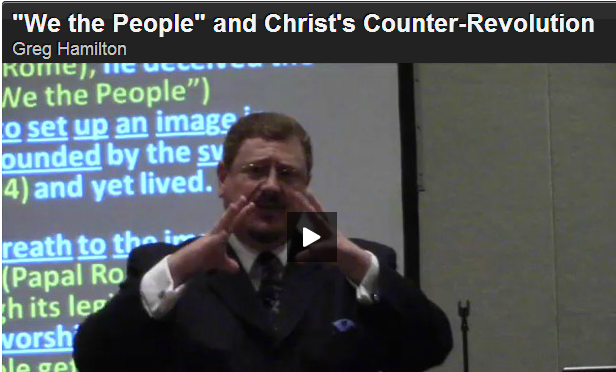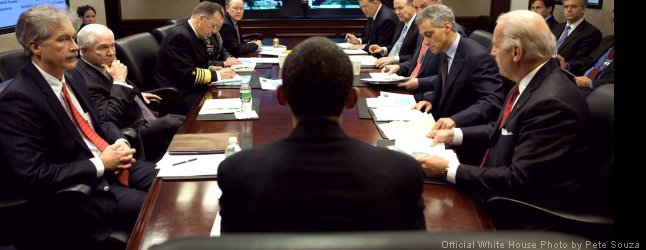By Gregory W. Hamilton – Repealing the Johnson Amendment is not about “free speech.” It is about giving politicians tax-deductible donations and endorsements in return for power.
Author: Greg Hamilton
(VIDEO) Greg Hamilton: “We The People” and Christ’s Counter-Revolution
Based on Mark 15 and Revelation 13, this seminar examines current events in light of Bible prophecy. The fickle crowd dynamics at Christ’s trial parallels today’s political and religious crowd. As our nation’s founders predicted, this foment is leading to the dissolution of our Constitution. But Christ is preparing those who will listen and learn—as He did with His disciples—for a greater revolutionary calling in these last days.
Discernibly Proactive: History of Adventist Involvement in Public Policy
[T]he leaders of the Church need to place a much higher priority on being involved in the public sphere, finding ways to be discernibly proactive while keeping the larger constitutional and prophetic pictures ever in focus. There are times to remain neutral, but we also need to be a serious player, not isolationists or sideliners.
Obama’s Olive Branch Doctrine (PART II) Interfaith Tolerance & the Reshaping of U.S. Foreign Policy
President Obama’s middle-ground approach to the credible and well-established “Clash of Civilizations” theme – when formulating international religious freedom policy – is best understood when placed on a scale between tolerance and international consensus (an interfaith, “soft-power” approach), and America’s constitutional ideal of religious freedom and human rights (an Evangelical and “exacting” approach). Yet both policy methods delimit religious freedom, threatening it altogether.
Obama’s Olive Branch Doctrine: Religion & the Path of Democratic Reform in the Arab-Muslim World (PART I)
By Gregory W. Hamilton, President Northwest Religious Liberty Association (NRLA) March 15, 2011 President Barack Obama came to Cairo in 2009 with the purpose of announcing to the Arab-Muslim world that he was not following his predecessor’s “Democracy Project” as a matter of U.S. Middle East policy. One could call this Obama’s “Olive Branch Doctrine”:…
Greg Hamilton’s Book Shelf – 2011
Greg Hamilton, President of the Northwest Religious Liberty Association and advisory panel member of ReligiousLiberty.TV presents his book list for 2010-2011. Amazon.com Widgets 1) Ratification: The People Debate the Constitution, 1787-1788 by Pauline Maier 2) Decision Points by George W. Bush 3) The Second Disestablishment: Church and State in Nineteenth-Century America by Steve Green 4)…
Oregon House of Representatives passes Workplace Religious Freedom Act
SB 786 has passed both houses of the legislature and is now on the Governor’s Desk.
Oregon Senate Passes Workplace Religious Freedom Act
WORKPLACE RELIGIOUS FREEDOM PASSES OREGON STATE SENATE! Tuesday, May 5, 2009 at the Oregon Legislature, with the leadership of Senator David Nelson (R-Pendleton District) and the bipartisan support of Republicans and Democrats, we finally realized the fruits of our labor in the Senate passage of our Oregon Workplace Religious Freedom Act, SB 786-A (see attached). The…
America’s Would-be Saviors
This article originally appeared on the Northwest Religious Liberty Association at http://www.nrla.com/article.php?id=75 and is used here by permission of the author. By Gregory W. Hamilton© August 5, 2008 It is not just the Pope who is drawing hundreds of thousands, with throngs pressing all about to get a glimpse of him, and maybe even a…
Manifest Destiny and the Momentum of Empire: Making Sense of America’s Global War on Terrorism
By Gregory W. Hamilton Today there are two significant global movements that enjoy a symbiotic relationship. The first involves America’s accelerated role as the world’s propagator of democratic values, and as a matter of national and international security the world’s enforcer of those values. The second is the not-so-obvious rapid global expansion of Christianity, a…



